The story of Anil Ambani can be summed up in two sentences by taking a look at his flagship company Reliance Communications.
RCom’s market capitalisation in 2007 was ₹ 2 Lakh crore; and now it is but a shadow of former self with its market cap standing at an embarrassing ₹ 1,148 crore.
In December 2018, just three months ago, Anil Ambani’s shareholding in RCom was 53.08%, and today it stands at just 21.97%.
The Anil Ambani Group’s stake in its telecom arm RCom fell from 53.08% to 37.57% in February of this year when L&T Finance and Edelweiss Group sold promoter shares pledged by Anil Ambani in Reliance group companies with them, in an attempt to recover loans taken from them. Other entities as well sold pledged shares of RCom, with Anil Ambani too selling a small portion in his company during this same period.
This move by L&T and Edelweiss did not sit well with the Anil Ambani promoted ADAG Group, whose shares took a massive beating in the stock market due to this action, and led to fall of ₹ 13,000 crores in market capitalisation. A defamation suit was filed to the tune of ₹ 2,700 crore against Edelweiss and L&T Finance to compensate the ADAG Group for fiscal and reputational loss. The Bombay High Court, however, refused to entertain the plea.
Then, as recently as between 25th and 27th March, IndusInd Bank and Rattan India Finance sold 4.52% and 11.08% of shares pledged with them by RCom, thereby bringing down the promoter shareholding of Anil Ambani further from 37.57% to 21.97%.
RCom’s troubles began in May 2018, when the NCLT admitted insolvency petitions filed by Swedish telecom equipment maker Ericsson against it, which was seeking payments of over ₹ 1,500 crore. But, after negotiations, the amount agreed was ₹ 550 crores. However, RCom already had a debt of ₹ 46,000 crore.
Amidst this crisis, the embattled promoter Anil Ambani had pledged most of his personal shareholding in group companies, to raise loans from financial institutions such as L&T Finance, Edelweiss and IndusInd Bank. These loans are at a 50% margin i.e. if you pledge shares of a market value of ₹ 1 crore, you get loans of ₹ 50 lacs, and if there is a fall in the market prices, which was the case with RCom, you need to top up or replenish this security, by pledging more shares with the lenders. But if you have pledged most of your shares, you are at a dead end, and the lender is bound to sell your shares to recover the loans, as has happened in the case of Anil Ambani.
And it is because of pledges such as these, that he lost control of his company.
As an independent media platform, we do not take advertisements from governments and corporate houses. It is you, our readers, who have supported us on our journey to do honest and unbiased journalism. Please contribute, so that we can continue to do the same in future.

